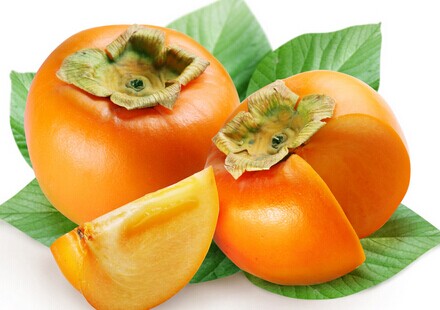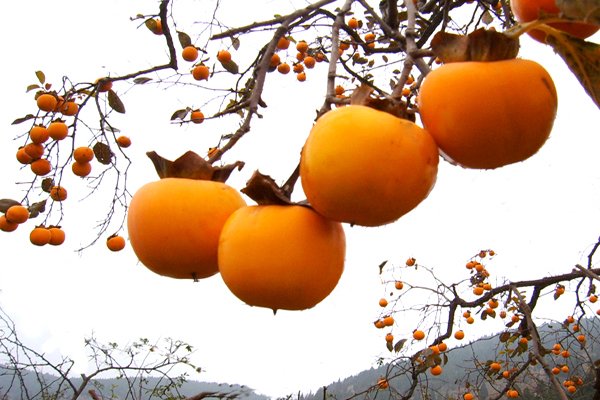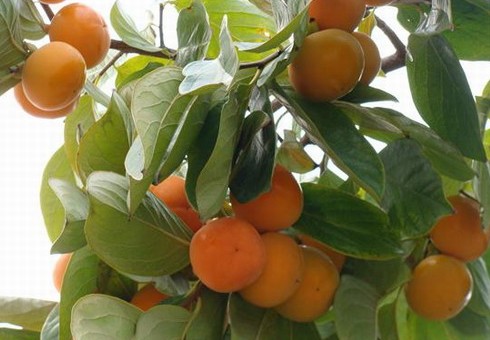What are the effects and functions of persimmon leaves
Efficacy and function of persimmon leaves
We all know that persimmons are very delicious, and persimmons are rich in nutritional value, but do not pay attention to the efficacy and role of persimmon leaves, persimmon leaves of medicinal value is also very high.
Persimmon leaves contain a lot of tannin, if you use persimmon leaves to take a bath is good, these substances through infiltration into the water can effectively kill a variety of bacteria and fungi, with the effect of cleaning and moisturizing the skin, is the simplest and seasonal beauty method.
Persimmon leaves not only contain considerable protein, amino acids and a variety of vitamins, but also choline, rutin and tannins, which have antibacterial, anti-inflammatory, blood-activating, antihypertensive, lipid-lowering and anticancer effects, especially the vitamin C content up to 1800mg/100g, which is much higher than that of common fruits and vegetables. It can resist scurvy, prevent and cure bronchitis, prevent and cure cancer.
At present, some people have developed persimmon leaf tea and other functional foods and drugs for the prevention and treatment of arteriosclerosis, hypertension and coronary heart disease. If you take persimmon leaves or rinse water as tea, it can also promote metabolism, reduce blood pressure, increase coronary blood flow and relieve cough and expectoration.
Persimmon leaves contain a high content of salmon, which affects the taste and needs to be seasoned and properly adjusted to produce delicious functional food, which has become a good health food for human beings to prevent and cure "civilized diseases". After persimmon leaves are made into persimmon tea, they have the following effects.

1. Improve the immune function of the body and promote the production of anti-cancer and anti-epidemic virus interferon, which has a good effect on colds, cancer and so on.
2. Soften blood vessels and enhance vascular elasticity, and adjust blood pressure physiologically, which also has a good effect on hypertension and hypotension.
3. Reduce blood lipids and prevent cerebral arteriosclerosis and coronary heart disease.
4. Diuresis and laxation, detumescence and weight loss.
5. Relieve summer heat and quench thirst.
6. Calming the mind, cosmetology, and subsiding senile plaque.
So how to make persimmon tea?
Thread the collected persimmon leaves into a string, soak them in a hot pot of 85 degrees for 15 seconds, then soak them in a cold water tank and put them in a ventilated place to dry. The fully dried persimmon leaves are crushed and put into a sealed container to become persimmon leaf tea.
Note: Persimmon leaf tea is weakly acidic, please do not drink coffee or black, green tea and other alkaline drinks. The soaking time should be extended, about 5 minutes.

The efficacy and function of specific persimmon leaves
1. Persimmon leaves not only contain considerable protein, amino acids and a variety of vitamins, but also choline, rutin and tannins, which have antibacterial, anti-inflammatory, blood-activating, antihypertensive, lipid-lowering and anticancer effects, especially the vitamin C content up to 1800mg/100g, which is much higher than that of common fruits and vegetables.
2. Persimmon cotyledons can resist scurvy, prevent and cure bronchitis, prevent and cure cancer. At present, some people have developed persimmon leaf tea and other functional foods and drugs for the prevention and treatment of arteriosclerosis, high blood pressure and coronary heart disease.
3. If you take persimmon leaves or rinse water as tea, it can also promote metabolism, reduce blood pressure, increase coronary blood flow and relieve cough and expectoration. Persimmon leaves contain a high content of salmon, which affects the taste and needs to be seasoned and properly adjusted to produce delicious functional food, which has become a good health food for human beings to prevent and cure "civilized diseases".
4. The outstanding nutrition and health function of persimmon leaf tea is that it contains natural Vc several times or even dozens of times higher than that of ordinary tea, and the contents of rutin, choline, flavonoid glycosides and 17 essential amino acids are also dozens of times higher than those of fruits, vegetables and common beverages. Natural Vc promotes human metabolism and has a certain curative effect on scurvy, cardiovascular disease and cancer. Rutin and choline can soften blood vessels and prevent arteriosclerosis. Flavonoid glycosides can reduce blood pressure, increase arterial blood flow and have obvious inhibitory effect on Staphylococcus aureus.
5. In addition to the efficacy and function of persimmon leaves and the medicinal value of persimmon leaves, persimmon leaves are a treasure in the eyes of traditional Chinese medicine, persimmon leaves are needed to treat many diseases, and the tea made from persimmon leaves also has a certain health effect.

Persimmons or persimmon leaves have very high nutritional value, and their efficacy and function are also very powerful, but we need to be careful not to eat persimmons on an empty stomach, because persimmons contain more tannic acid and pectin. On an empty stomach, they will form lumps of different sizes under the action of stomach acid. If these lumps cannot reach the small intestine through the pylorus, they will remain in the stomach to form stomach persimmon stones, such as apricot stone at first. But it will get bigger and bigger. If the stomach persimmon stone can not be excreted naturally, it will cause digestive tract obstruction, severe epigastric pain, vomiting, and even hematemesis. Stomach persimmon stone as big as a fist has been found during the operation. So what do you need to pay attention to when eating persimmons?

Matters needing attention in eating persimmon
1. Persimmon is rich in sugar, pectin and vitamins, which has good heat-clearing and moistening effect. It is a natural health food for patients with chronic bronchitis, hypertension and arteriosclerosis. However, a large amount of tannic acid in persimmons will affect the body's absorption of iron, so it is not appropriate to eat more.
2. Because persimmons contain more tannic acid and pectin, they will form lumps of different sizes under the action of gastric acid on an empty stomach. If these lumps cannot reach the small intestine through the pylorus, they will remain in the stomach to form stomach persimmon stones. Small stomach persimmon stones such as apricot stone at first, but will accumulate bigger and bigger. If the stomach persimmon stone can not be excreted naturally, it will cause digestive tract obstruction, severe epigastric pain, vomiting, and even hematemesis. Stomach persimmon stone as big as a fist has been found during the operation. If the stomach has a "bottom", the formation of stomach persimmon stone can be avoided. So try to eat about 1 hour after meal to avoid the formation of persimmon stone in the stomach.

3. Some people feel that chewing persimmon skin while eating persimmon is more delicious than eating persimmon alone. In fact, this method of eating is unscientific. Because most of the tannic acid in persimmon is concentrated in the skin, when the persimmon is deastringent, it is impossible to remove all the tannic acid, if you eat it with the skin, it is easier to form stomach persimmon stone, especially when the deastringent process is not perfect, the skin contains more tannic acid.
4. in addition, persimmons are cold, if they suffer from cold stomach, they are not suitable for consumption.
Matters needing attention in eating persimmon
1. Persimmon is rich in sugar, pectin and vitamins, which has good heat-clearing and moistening effect. It is a natural health food for patients with chronic bronchitis, hypertension and arteriosclerosis. However, a large amount of tannic acid in persimmons will affect the body's absorption of iron, so it is not appropriate to eat more.
2. Because persimmons contain more tannic acid and pectin, they will form lumps of different sizes under the action of gastric acid on an empty stomach. If these lumps cannot reach the small intestine through the pylorus, they will remain in the stomach to form stomach persimmon stones. Small stomach persimmon stones such as apricot stone at first, but will accumulate bigger and bigger. If the stomach persimmon stone can not be excreted naturally, it will cause digestive tract obstruction, severe epigastric pain, vomiting, and even hematemesis. Stomach persimmon stone as big as a fist has been found during the operation. If the stomach has a "bottom", the formation of stomach persimmon stone can be avoided. So try to eat about 1 hour after meal to avoid the formation of persimmon stone in the stomach.

3. Some people feel that chewing persimmon skin while eating persimmon is more delicious than eating persimmon alone. In fact, this method of eating is unscientific. Because most of the tannic acid in persimmon is concentrated in the skin, when the persimmon is deastringent, it is impossible to remove all the tannic acid, if you eat it with the skin, it is easier to form stomach persimmon stone, especially when the deastringent process is not perfect, the skin contains more tannic acid.
4. in addition, persimmons are cold, if they suffer from cold stomach, they are not suitable for consumption.
Related
- Wuhan Hospital Iron Tree Blooming Result Was Instantly Frightened by the Gardener Master
- Which variety of camellia is the most fragrant and best? Which one do you like best?
- What is the small blue coat, the breeding methods and matters needing attention of the succulent plant
- Dormancy time and maintenance management of succulent plants during dormancy
- Minas succulent how to raise, Minas succulent plant pictures
- What are the varieties of winter succulent plants
- How to raise succulent plants in twelve rolls? let's take a look at some experience of breeding twelve rolls.
- Attention should be paid to water control for succulent plants during dormant period (winter and summer)
- Watering experience of twelve rolls of succulent plants
- Techniques for fertilizing succulent plants. An article will let you know how to fertilize succulent plants.



